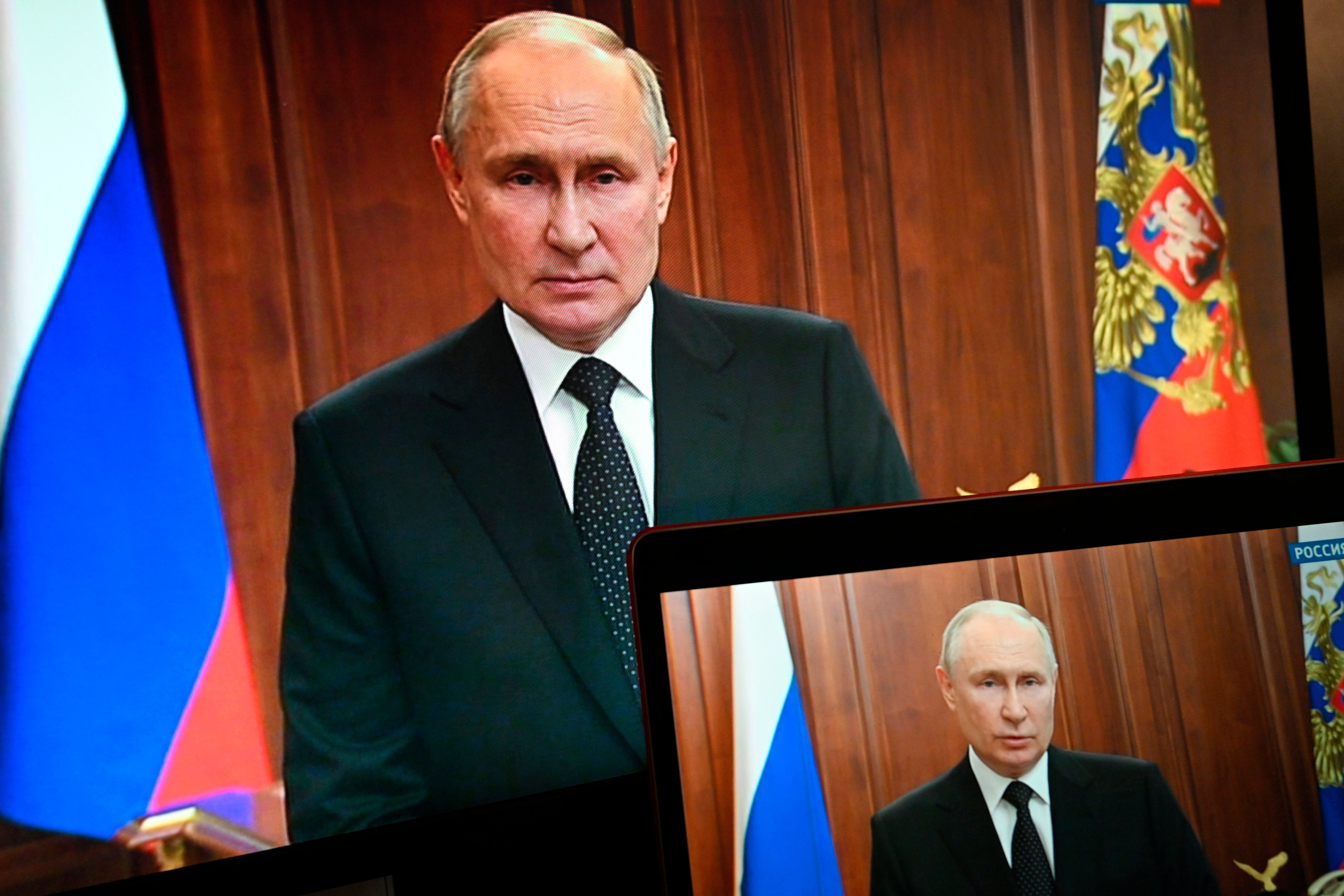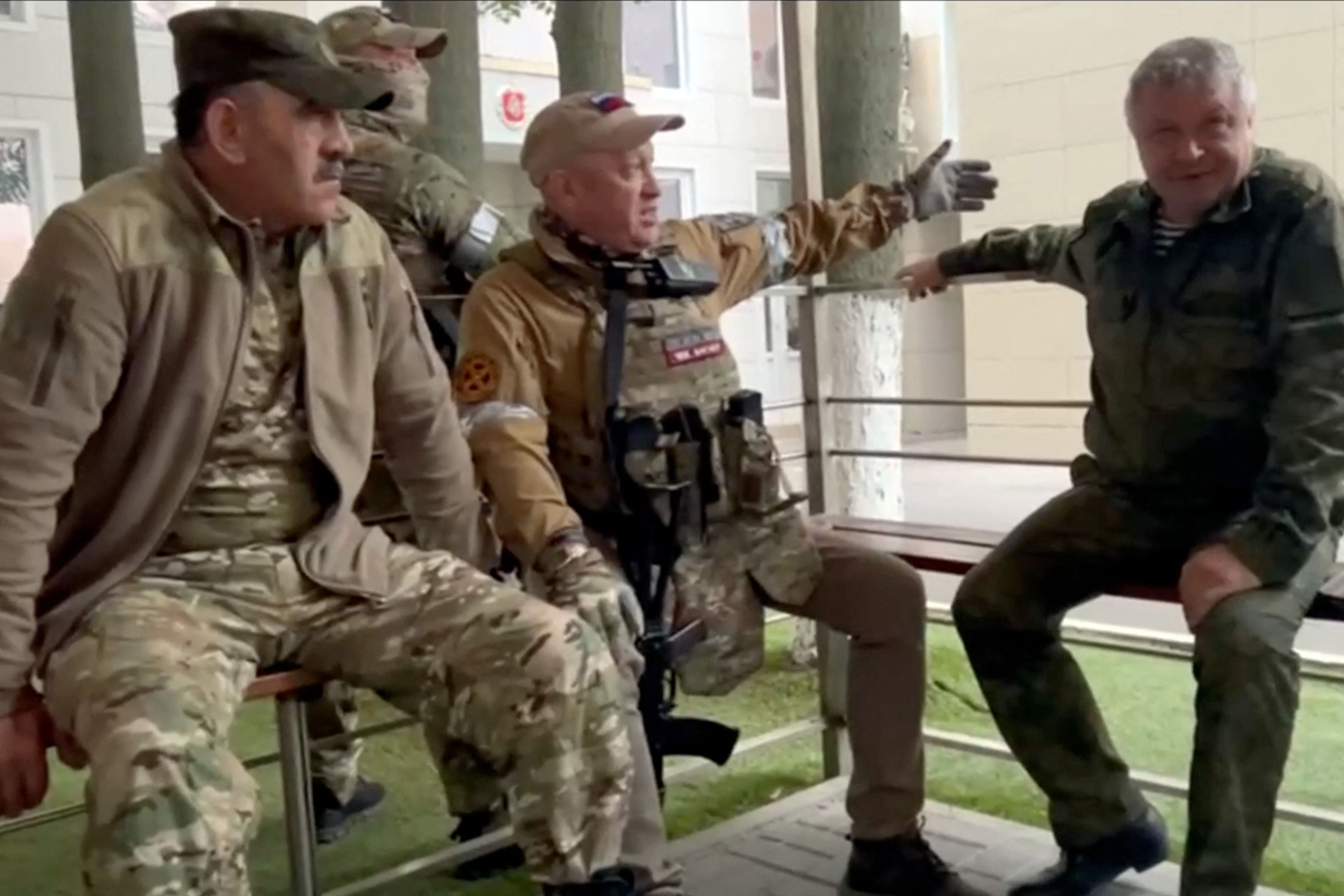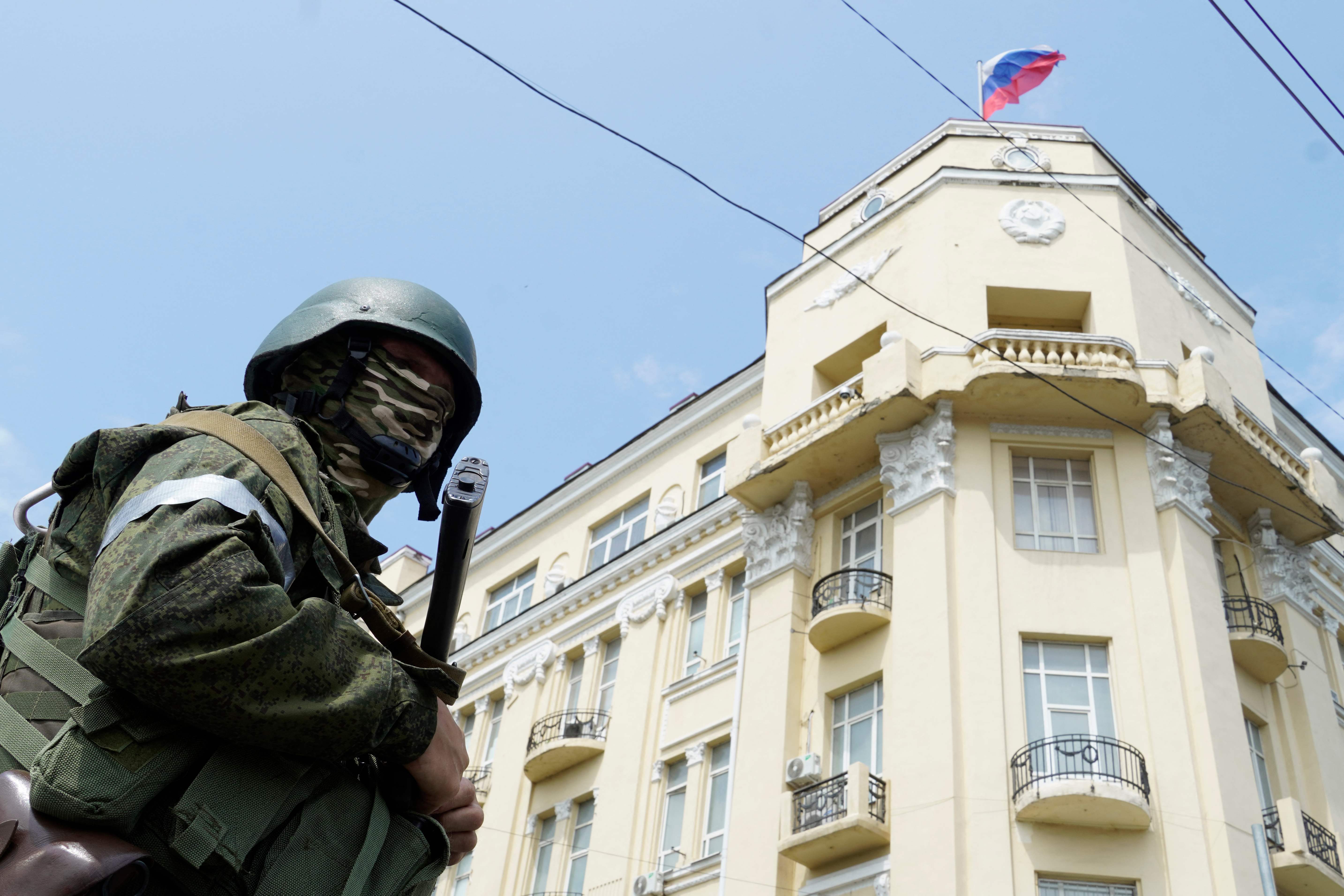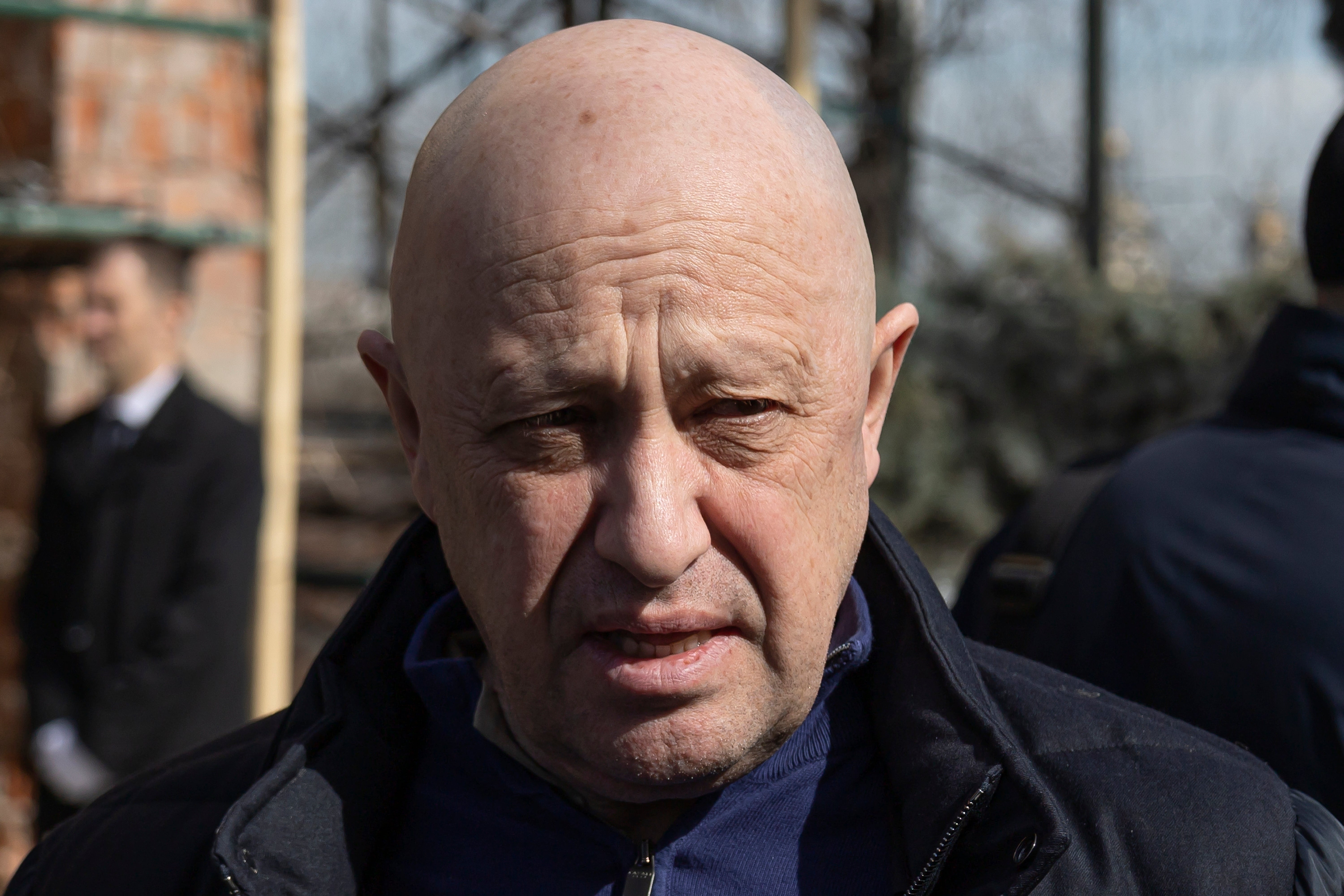Is this the end for Putin? His country now stands on the edge of civil war
Putin’s invasion, which sought to occupy Ukraine in a matter of days and impose regime change on Kyiv, has ended up threatening the power structure in the Kremlin, writes Kim Sengupta


Your support helps us to tell the story
From reproductive rights to climate change to Big Tech, The Independent is on the ground when the story is developing. Whether it's investigating the financials of Elon Musk's pro-Trump PAC or producing our latest documentary, 'The A Word', which shines a light on the American women fighting for reproductive rights, we know how important it is to parse out the facts from the messaging.
At such a critical moment in US history, we need reporters on the ground. Your donation allows us to keep sending journalists to speak to both sides of the story.
The Independent is trusted by Americans across the entire political spectrum. And unlike many other quality news outlets, we choose not to lock Americans out of our reporting and analysis with paywalls. We believe quality journalism should be available to everyone, paid for by those who can afford it.
Your support makes all the difference.One of the most astonishing episodes in modern history is unfolding by the hour as Russia appears to be on the precipice of civil war. Artillery and airstrikes rain down on the country’s own forces, and the fighters of Yevgeny Prigozhin appear to be marching on Moscow. Although the immediate sense of danger for the Vladimir Putin regime eased as the Wagner Group leader halted his advance on Saturday night.
Vladimir Putin gave an emergency televised address after the Wagner mercenary group occupied the military headquarters in Rostov-on-Don, which has acted as a base of operations for Russia’s invasion of Ukraine. The president spoke of the bitter strife following the revolution in 1917, when “Russians were killing Russians”, and warned that his country was “facing the toughest battle for its future, it is a question of Russia’s millennial history”.
In a night and morning of constant twists and turns Yevgeny Prigozhin, a former convict and former ally of the president, appeared in Rostov and demanded that the Russian military high command, Putin’s bête noire defence minister Sergei Shoigu, and military chief Valery Gerasimov attend to him.
Failure to do so, said “Putin’s Chef” (the nickname from the many government catering contracts Prigozhin was awarded), would mean he and his tanks would head for Moscow. Hours later there were reports that Wagner fighters had taken over Voronezh, just 500 miles from the capital. Russian warplanes, according to a number of monitoring sites, have been carrying out airstrikes on the A4 highway. The reports cannot be independently verified.
A “counter-terrorism regime” was reported to have been enforced in Moscow and surrounding districts with units of Spetsnaz, special forces, FSB’s Alpha Force, the National Guard and Rosgvardiya (a force Prigozhin has appealed to join him) sent to protect the routes to Moscow.
Wagner’s offices in St Petersburg, as well as Prigozhin-linked properties, were raided by Russian police. Little of the group’s operational planning for Ukraine was carried out from there. But there could, say security officials, be details of the company’s highly lucrative business ventures, including billions of dollars in gold and other mining operations in Africa.
Meanwhile, Russian airstrikes continued in Ukraine with a number of cities, including Kyiv, being hit. But the disarray and division in Russian ranks should now provide a massive boost to the Ukrainian counteroffensive, which had, hitherto, been making little progress.

Putin’s invasion, which sought to occupy Ukraine in a matter of days and impose regime change on Kyiv, has ended up threatening the power structure in the Kremlin. As of now, the chances of a Russian victory seem to be remote.
The 1905 revolution in Russia began after another failed war, against Japan, and although the chances of something on that scale may still be unlikely, some of the Kremlin’s exiled opponents were dreaming of a victorious return.
Mikhail Khodorkovsky, an anti-Kremlin figure and former oil tycoon, urged Russians to support the Wagner Group, “We need to help now; and then, if necessary, we will fight this one, too,” he said. He added that it was important to back “even the devil” if he decided to take on the Kremlin. “And yes, this is just the beginning.”

Russian exiled militia, supported by Ukrainian forces, have been carrying out cross-border raids for some months now. They were waiting, they said, for orders to carry out major operations.
Nicolai Koznetsov, a member of the Freedom for Russia Legion, wanted to stress the following: “We have been saying for a long time about anger in the [Russian] military, not just Wagner, but other units. We are going to see this now spread very quickly, just watch. A lot of the army will not oppose Prigozhin.”
Prigozhin posted a message on Telegram on Saturday morning declaring that he and his fighters were prepared to sacrifice themselves for the country. “All of us are ready to die, all 25,000, and then another 25,000, we will do so for the Russian people”.
More than 80 per cent of Wagner’s fighters in Ukraine, it is estimated, are convicts who have been recruited in a prison amnesty and it is unclear whether they would indeed be prepared to sacrifice themselves in a war in which the odds – numerically and in terms of weaponry – are stacked against them.

For the time being, holding Rostov gives Prigozhin enormous leverage. The city, just 60 miles from the Ukrainian border, is the base of Russia’s southern military district command, and the 58th Combined Arms Army facing the Ukrainian counteroffensive. Wagner is controlling the airport from where, Prigozhin has claimed, Russian warplanes have been attacking his fighters on orders of Shoigu. He announced that “we took [the airport] under control so that attack aviation did not strike us, but strike Ukrainians”. He also insisted that his fighters would not interfere with the conduct of the war.
How long will he maintain that position? According to recently leaked Pentagon papers, Prigozhin was prepared to reveal troop and ammunition positions in return for the Ukrainians ending assaults on his mercenary fighters and withdraw from Bakhmut, the Donbas town which has been turned into a charnel house after months of savage fighting.
Volodymyr Zelensky’s government, according to the documents, distrusted and turned down the offer. The US administration, when made aware of the proposed deal, had also urged caution. Kyrylo Budanov, the head of GUR, the Ukrainian military intelligence service, who allegedly held the talks with Prigozhin, has refused to comment.
Prigozhin is now in the centre of the arena. What he does, and what happens to him, will play an important role in not just the Ukraine war, but whether there really is a civil war in Russia.



Join our commenting forum
Join thought-provoking conversations, follow other Independent readers and see their replies
Comments